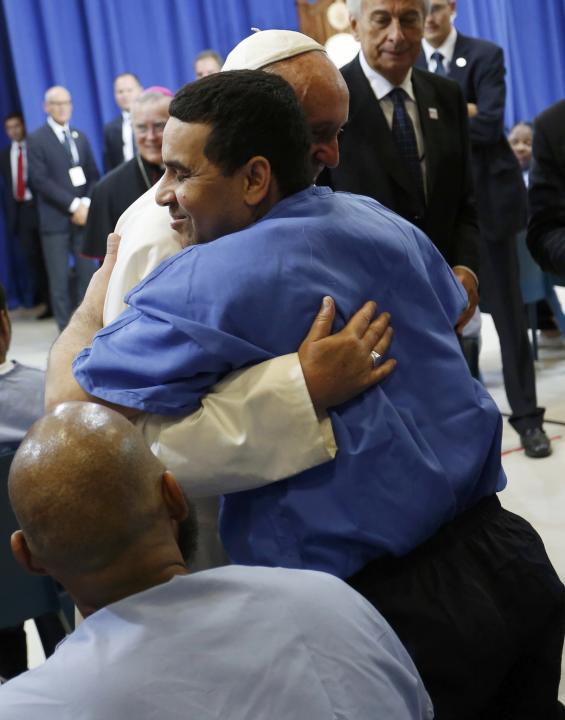Sunday, September 27, 2015
Pope Francis Embraces the Guilty and Shuns the Innocent
Last week there were more abortions in the United States (16,799) than there have been executions over the last 400 years (15,269). There were 35 criminals put to death in the U.S. last year as compared to more than a million babies who had the death penalty imposed on them without the benefit of judge, jury or appeal. Yet Pope Francis, in his pandering address to a joint session of Congress, barely alluded to abortion and did not condemn it, but spoke at length and vehemently against the death penalty. This is what it means to have a pope who is a moral relativist, someone who, simply put, cannot distinguish between good and evil. Such myopism would be disastrous for any man and more disastrous for those who have anything to do with him. But for a pope, it is a calamity for all mankind.
Now the pope has just met and embraced prison inmates in Philadelphia, murderers, rapists and other criminals, most, no doubt, moral relativists like himself, offering to all support and encouragement as if each were St. Dismas (The Good Thief). Francis has said that "Jesus was a failure in life," and so when he looks at the faces of these prisoners, he must see the image of Christ. Aborted babies are not pretty to look at, but their humanity shines all the more because of the barbarity to which they have been subjected.
When Francis visited Cuba just a week ago, he met and embraced much more notorious and prolific murderers. Unlike the prisoners in Philadelphia, they have never been called to account for their crimes and it is likely that they never will be. History will not absolve Fidel or Raúl Castro, but Pope Francis has. When a priest visits the home of an unrepentant public sinner and does not ask him to repent, but showers him with praise and gifts — indeed, indulgences — the sin is not expunged but it is rewarded and public morals and religion are defiled. This itself is a mortal sin, for in condoning Castro's crimes Francis has acquired a share in them.
The pope did not visit the 3000 common criminals that Raúl Castro amnestied in his honor. He could well have preened himself on that "victory" but for the fact that his refusal to meet with Cuba's dissidents and political prisoners would have seemed even more inexplicable and inexcusable if the pope had embraced the guilty and shunned the innocent, and since he would not embrace the innocent he found it expedient to shun them both. For Francis, the opponents of a one-party state are simply rival politicians even if politics as such does not exist in their country. He does not recognize them as victims of the regime but as pariahs, and even worse than pariahs because they threaten the special relationship between Church and State which the pope is so anxious to maintain and expand at any cost.
Pope Francis cannot make Cuban dissidents disappear, But he can do the next best thing — ignore and marginalize them. And he has.
Subscribe to:
Post Comments (Atom)

1 comment:
Before Pope Francis calls for political leaders to abolish the death penalty via their secular laws, he should first abolish it within his very own sacred traditions since the Catechism of the Catholic Church #2266 allows for it, “Preserving the common good of society requires rendering the aggressor unable to inflict harm. For this reason the traditional teaching of the Church has acknowledged as well-founded the right and duty of legitimate public authority to punish malefactors by means of penalties commensurate with the gravity of the crime, NOT EXCLUDING, IN CASE OF EXTREME GRAVITY, THE DEATH PENALTY. For analogous reasons those holding authority have the right to repel by armed force aggressors against the community in their charge.”
Post a Comment